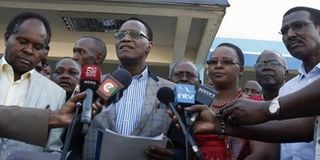Breaking News: At least 10 feared to have drowned in Makueni river
Secure your institutions, Jacob Kaimenyi says

From left: University of Nairobi Vice Chancellor Peter Mbithi, Education Cabinet Secretary Jacob Kaimenyi, Kenyatta National Hospital CEO Lily Koros and Kenya Power Managing Director Ben Chumo address journalists at Kenyatta National Hospital on April 12, 2015 following a security scare at the University of Nairobi's Kikuyu campus. FILE PHOTO | EVANS HABIL |
What you need to know:
- Education CS tells institutions to follow government policies on security.
- The CS also said that he is not out to take over the powers of TSC.
Education Cabinet Secretary Jacob Kaimenyi has told the management of institutions of learning that security is their responsibility.
Prof Kaimenyi said the management boards should engage him with regards to resources for that purpose.
Speaking in Nairobi on Tuesday during the launch of the Global Monitoring Report — Education for All (2000-2015), the CS noted that students are not yet prepared to handle disasters and emergencies, citing the recent stampede at the University of Nairobi's Kikuyu campus that resulted in one death and left several injured.
He expressed regret that despite the government having developed several policies on the security of students, the institutions were not adhering to them.
"We have developed several manuals on security in schools such as disaster risk reduction in schools, among others. Kindly read these manuals," he said.
According to the CS, it is important that in future, security education is introduced in schools.
NOT UNDERMINING TSC
Prof Kaimenyi also revisited the controversial Basic Education Regulations, saying that he is not out to take over the powers of the Teachers Service Commission.
Prof Kaimenyi said that he played a key role in strengthen TSC when he served in the Kamunge Commission and therefore he will be the last person to undermine the teachers' employer.
He said that the Basic Education Act gives him powers under section 53 to be responsible for the overall governance and management of basic education in the country.
“TSC has its functions which is hiring, transferring and promoting of teachers and I have not taken over those functions,” said Prof Kaimenyi.
He maintained that his major concern is accountability of resources allocated to schools, insisting that teachers will not be exempt from transparency and accountability.
Prof Kaimenyi said the ministry believes in consultation and therefore those with majority views should be allowed to move ahead.
“We do not have a preserve of ideas as a ministry. We have on many occasions invited other stakeholders who have agreed with others in several ideas only to turn around and denounce them,” he said.
LACK OF TRAINING
The Global Monitoring Report revealed that older teachers in the country lose skills over time due to lack of in-service training.
It further revealed that some teachers do not understand the curricula due to lack of support from the government and other training institutions.
Most teachers who are pursuing further education are doing so at their own cost.
The report notes that there is a lack of innovative teaching methods in private schools in Kenya with public schools having more scope to be innovative with the curriculum while private schools are more wedded to parent demands for good examination results.
The report further notes that living in a rural area or being poor and marginalised reduces a child’s chances of attending early learning programmes.
“Many countries have policies to include pre-primary education in the basic education cycle, but do not support them financially,” reveals the report.
On Tuesday, Prof Kaimenyi said the government was also working on a review of the curriculum in order to see where it can be improved.
The CS admitted that there are cases of teacher absenteeism and disclosed that the ministry is in the process of undertaking a study to understand the cause.
He added that TSC, as the institution tasked with hiring and disciplining teachers, should also take up the issue.
Prof Kaimenyi also challenged teachers to seek further training at the Kenya Education Management Institute in order to strengthen their skills and competency.
The government has also worked with the teachers’ unions to draft a Bill to reinforce mechanisms for reporting and following up on incidents of sexual violence in schools.
MEET TARGETS
The report notes that an extra $22 billion a year is needed on top of already ambitious global government contributions to ensure that the new global education targets being set for 2030 are achieved.
It discloses that Kenya is not among countries that have achieved a gross pre-primary education enrolment ratio of 80 per cent or more.
The countries that have achieved this include Equatorial Guinea, Ghana, Mauritius, Angola, Capo Verde, the Seychelles and South Africa.
Sub-Saharan Africa had about 3.4 million primary school teachers in 2012, an increase of nearly 1.5 million since 1999.
Despite this, the report notes teacher shortages remain a serious concern, with the region accounting for 63 per cent of the 1.4 additional teachers needed to achieve universal primary education.
“Trained teachers remain in short supply: in several sub-Saharan African countries, less than 50 per cent are trained. As a result, many children spend two or three years in school without acquiring basic reading and writing skills,” adds the report.
Prof Kaimenyi said the government is aware of the shortage of teachers in the country.
The report is based on an independent survey commissioned by Unesco on behalf of the international community. It involved agencies and governments.





